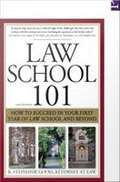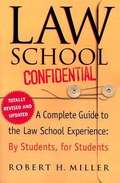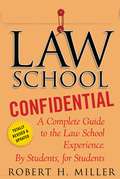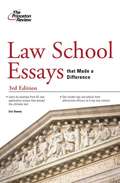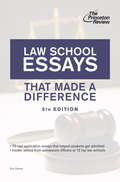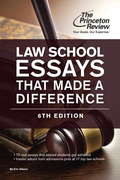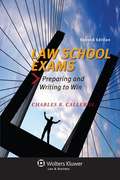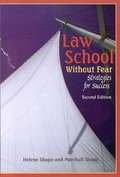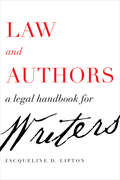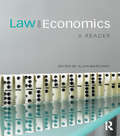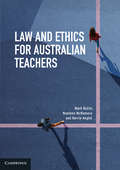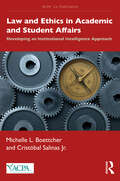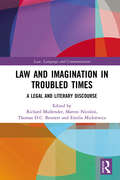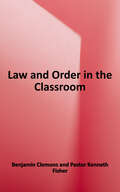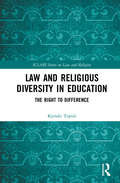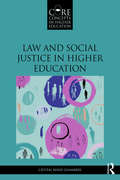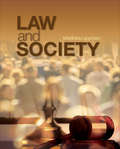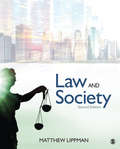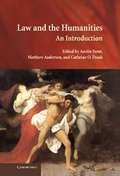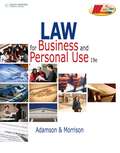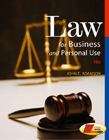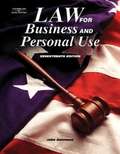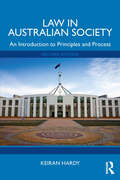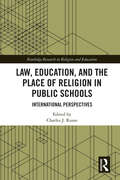- Table View
- List View
Law School 101
by R. Stephanie GoodEverything you need to know to excel in your first year of law school and beyond. Whether you are thinking about law school, have already applied and been accepted, or started your first year, you need to know what to expect in law school and how to succeed. Law School 101 gives an honest look at the law school experience from someone who has been there, and tells students what they should really expect. It also helps students develop the skills necessary to survive the challenges and excel in their program. It includes the survival skills you need in key areas, including: Handling the pressure of law school What to expect from your classes and professors How to study for and pass your law school exams Job information for first and second year students Avoid common pitfalls, decode law school myths, and achieve your dream.
Law School Confidential
by Robert M. MillerIt provides a comprehensive, chronological account of what to expect at every stage of law school experience. This new, completely revised and updated edition contains the very latest information and strategies for thriving in law school.
Law School Confidential: A Complete Guide to the Law School Experience: By Students, for Students
by Robert H. MillerI WISH I KNEW THEN WHAT I KNOW NOW!Don't get to the end of your law school career muttering these words to yourself! Take the first step toward building a productive, successful, and perhaps even pleasant law school experience--read this book!Written by students, for students, Law School Confidential has been the "must-have" guide for anyone thinking about, applying to, or attending law school for more than a decade. And now, in this newly revised third edition, it's more valuable than ever. This isn't the advice of graying professors or battle-scarred practitioners long removed from law school. Robert H. Miller has assembled a blue-ribbon panel of recent graduates from across the country to offer realistic and informative firsthand advice about what law school is really like.This updated edition contains the very latest information and strategies for thriving and surviving in law school--from navigating the admissions process and securing financial aid, choosing classes, studying and exam strategies, and securing a seat on the law review to getting a judicial clerkship and a job, passing the bar exam, and much, much more. Newly added material also reveals a sea change that is just starting to occur in legal education, turning it away from the theory-based platform of the previous several decades to a pragmatic platform being demanded by the rigors of today's practices.Law School Confidential is a complete guide to the law school experience that no prospective or current law student can afford to be without.
Law School Essays That Made a Difference
by Eric OwensOne of the best ways to stand out in a crowd of applicants to law school is to write an exceptional personal statement. Law School Essays That Made a Difference, 3rd Edition, contains 70 real application essays as well as interviews with admissions pros and with students who've been through the process and made it to law school.
Law School Essays That Made a Difference, 5th Edition
by Princeton ReviewStand out in a crowd of law school applicants with an outstanding personal statement. Law schools are receiving more applications than ever with high LSAT scores and excellent grades. To get in, you also need a personal statement that shines. The fifth edition of Law School Essays That Made a Difference gives you the tools to do just that. It includes: * 70 real essays written by 62 unique future lawyers attending Columbia, Cornell, Duke, Georgetown, Harvard, Northwestern, Vanderbilt, Yale, and other top law schools--along with each applicant's test scores, GPA, and admissions profile * An overview of law school admissions and a "crash course" in prepping your application * Insider advice: Interviews with admissions pros at Berkeley, Cornell, Duke, Georgetown, Northwestern, Texas Tech, UCLA, University of Kansas, University of Michigan, UPenn, University of Richmond, and William & Mary Law School Essays That Made a Difference, 5th Edition includes essays written by students who enrolled at the following schools:Amherst CollegeBard CollegeBarnard CollegeBoston CollegeBrown UniversityBryn Mawr CollegeCalifornia Institute of TechnologyClaremont McKenna CollegeCornell UniversityDartmouth CollegeDuke UniversityEmerson CollegeFranklin W. Olin College ofEngineeringGeorgetown UniversityHarvard CollegeMassachusetts Institute ofTechnologyMiddlebury CollegeNew College of FloridaNew York UniversityNorthwestern UniversityPomona CollegePrinceton UniversityRice UniversitySmith CollegeStanford UniversitySwarthmore CollegeUniversity of California--San DiegoUniversity of Notre DameUniversity of PennsylvaniaWashington and Lee UniversityWellesley CollegeWesleyan UniversityYale University
Law School Essays That Made a Difference, 6th Edition
by Princeton ReviewThe inside word on law school admissions.To get into a top law school, you need more than high LSAT scores and excellent grades--you also need a personal statement that shines. Law School Essays That Made a Difference, 6th Edition, gives you the tools to craft just that. This book includes:* 70 real essays written by 63 unique law students attending Columbia, Harvard, Northwestern, Vanderbilt, and other top law schools--along with each applicant's test scores, GPA, and admissions profile * An overview of law school admissions and tips for prepping your applications* Insider advice: Interviews with admissions pros at 17 top law schools, including Berkeley, Northwestern, UCLA, and many moreLaw School Essays That Made a Difference, 6th Edition, includes essays written by students who enrolled at the following law schools:American University Washington College of LawBoston College Law SchoolBoston University School of LawColumbia University School of LawCornell University School of LawDuke University School of LawEmory University School of LawGeorgetown University Law CenterHarvard University Law SchoolNew York University School of LawNorthwestern University School of LawThe University of Chicago Law SchoolUniversity of Michigan Law SchoolUniversity of Pennsylvania Law SchoolUniversity of Virginia Law SchoolYale University Law SchoolFrom the Trade Paperback edition.
Law School Exams: Preparing and Writing to Win
by Charles CallerosOverview Law School Study Techniques Preparing for Exams Taking Law School Exams
Law School Without Fear: Strategies For Success
by Helene Shapo Marshall ShapoWith a total of 50 years of experience teaching law school between them, the authors of Law School Without Fear offer law students strategies for coping with law school successfully and advice on how to get the most out the law school experience. The book discusses in simple terms what students need to know about law school, covering common problems that law students encounter and solutions to those problems. Topics covered include briefing a case, precedent and how to use it, balancing competing interests and factors, legal writing, and psychological tips for the study of law. Special features include a comprehensive approach to the first year, from the bewildering first day of class through examinations; advice on how to study, how to deal with the classroom experience, and how to take exams; wonderfully brief summaries of fundamental ideas of policy common to almost all law classes; and glossary of frequently used words and phrases.
Law and Authors: A Legal Handbook for Writers
by Jacqueline D. LiptonThis accessible, reader-friendly handbook will be an invaluable resource for authors, agents, and editors in navigating the legal landscape of the contemporary publishing industry. Drawing on a wealth of experience in legal scholarship and publishing, Jacqueline D. Lipton provides a useful legal guide for writers whatever their levels of expertise or categories of work (fiction, nonfiction, or academic). Through case studies and hypothetical examples, Law and Authors addresses issues of copyright law, including explanations of fair use and the public domain; trademark and branding concerns for those embarking on a publishing career; laws that impact the ways that authors might use social media and marketing promotions; and privacy and defamation questions that writers may face. Although the book focuses on American law, it highlights key areas where laws in other countries differ from those in the United States. Law and Authors will prepare every writer for the inevitable and the unexpected.
Law and Economics: A Reader (New Horizons In Law And Economics Ser. #18)
by Alain MarcianoThis book brings together the most authoritative articles on Law and Economics and the interaction between the two disciplines as well as the use of economic tools to analyse legal problems. Aimed at students experiencing the subject for the first time, the selections are interlaced with a wealth of features including explanatory introductions and exercises. Key features of the reader include: - The accessibility of the material: the articles should be understandable to those with only a limited background in economics and law. - The book’s focus on the most important and basic – foundational – issues in law and economics. - An exposition of the opposition between the different legal systems that exist in the world including common law, civil law and public law. - Debates viewed from the perspective of the scholars from a range of backgrounds are presented as well as all the key figures in economics and in law. The book should prove to be an essential resource to all students studying this burgeoning field and represents an exciting introduction to one of the key disciplines which has grown up in the social sciences in recent times.
Law and Ethics for Australian Teachers
by Mark Butlin Noeleen McNamara Kerrie AnglinGetting to grips with law and policy can be daunting for beginning and established teachers alike. Law and Ethics for Australian Teachers provides an overview of the professional, legal and ethical issues teachers may encounter in the classroom and the broader school environment. This book breaks down the relevant case law, as well as state and territory legislation and policy, in an accessible way to help readers navigate these complex issues. It covers topics including duty of care and mandatory reporting, work health and safety issues, family court orders and parenting plans, suspensions and exclusions, and criminal law issues. Each chapter features case studies, definitions of key terms, detailed scenarios and end-of-chapter questions to help readers understand a wide range of professional issues. Written by a team of authors with both teaching and legal expertise, Law and Ethics for Australian Teachers is an essential resource for pre- and in-service teachers.
Law and Ethics in Academic and Student Affairs: Developing an Institutional Intelligence Approach (An ACPA Co-Publication)
by Michelle L. Boettcher Cristóbal Salinas Jr.This valuable resource provides academic and student affairs practitioners with the tools to make informed legal and ethical decisions in their college and university contexts. Law is constantly changing and is interpreted differently from campus to campus based on institutional culture and history. This text provides higher education practitioners with tools to anticipate practical and responsible action, engaging readers in anticipatory and reflective practice. In this text, Boettcher and Salinas introduce the Institutional Intelligence Model, a helpful framework that guides practitioners in examining a wide variety of campus issues. Throughout the book, readers can explore perspectives from current practitioners and utilize case studies to examine specific topics, including admissions, academics, student living, confidential resources, and graduate student experiences. By using the strategies in this book, practitioners will be equipped to successfully navigate legal and ethical issues on their campuses. This text is ideal for graduate students, student and academic affairs professionals, and those in leadership positions responsible for working with and supporting students and staff teams.
Law and Imagination in Troubled Times: A Legal and Literary Discourse (Law, Language and Communication)
by Richard MullenderThis collection focuses on how troubled times impact upon the law, the body politic, and the complex interrelationship among them. It centres on how they engage in a dialogue with the imagination and literature, thus triggering an emergent (but thus far underdeveloped) field concerning the ‘legal imagination.’ Legal change necessitates a close examination of the historical, cultural, social, and economic variables that promote and affect such change. This requires us to attend to the variety of non-legal variables that percolate throughout the legal system. The collection probes ‘the transatlantic constitution’ and focuses attention on imagination in a common law context that seems to foster imagination as a cultural capability. The book is divided into four parts. The first part begins with a set of insights into the historical development of legal education in England and concludes with a reflection on the historical transition of England from an absolute monarchy to a republic. The second part of the volume examines the role that imagination plays in the functioning of the courts. The third part focuses on patterns of thought in legal scholarship and detects how legal imagination contributes to the process of producing new legal categories and terminology. The fourth part focuses on patterns of thought in legal scholarship, and looks to the impact of the imagination on legal thinking in the future. The work provides stimulating reading for those working in the areas of legal philosophy, legal history and law and humanities and law and language.
Law and Order in The Classroom
by Benjamin Clemons Pastor Kenneth FisherAs a classroom teacher, you're called upon to be judge, jury, and sometimes even "executioner." Dispensing classroom discipline is much more than just maintaining good order—true Christian disciplining begins with a proper understanding of the law and the gospel and how they function together.
Law and Religious Diversity in Education: The Right to Difference (ICLARS Series on Law and Religion)
by Kyriaki TopidiReligion is a prominent legal force despite the premise constructed and promoted by Western constitutionalism that it must be separated from the State in democracies. Education constitutes an area of human life that leaves ample scope for the expression of religious identity and shapes the citizens of the future. It is also the place of origin of a considerable number of normative conflicts involving religious identity that arise today in multicultural settings. The book deals with the interplay of law and religion in education through the versatility of religious law and legal pluralism, as well as religion’s possible adaptation and reconciliation with modernity, in order to consider and reflect on normative conflicts. It adopts the angle of the constitutional dimension of religion narrated in a comparative perspective and critically reflects on regulatory attempts by the State and the international community to promote new ways of living together.
Law and Social Justice in Higher Education (Core Concepts in Higher Education)
by Crystal Renée ChambersThe latest volume in the Core Concepts in Higher Education series explores the complexity of law in higher education and both the limits and opportunities of how law can promote inclusivity and access on campus. Through a historical and legal framework, this volume discusses undergraduate students' histories of inclusion and struggles for social justice in higher education by race, sex, social class, dis/ability, and sexual orientation. Bridging research, theory, and practice, Law and Social Justice in Higher Education encourages future and current higher education and student affairs practitioners to consider how they can collaborate to further a just society. Special features: Discussion of case law illustrates the reach and limits of law and where higher education professionals can continue to push for social justice. Accessible to non-lawyers, chapters highlight key legal terms and key concepts to guide readers at the beginning of each chapter. End-of-chapter questions provide prompts for discussion and encourage student interactivity.
Law and Society
by Matthew LippmanLaw and Society offers a contemporary yet concise description of the structure and function of legal institutions, along with a lively discussion of both criminal and civil law, as well as basic legal doctrine. Unlike comparable books on law and society available today, Matthew Lippman takes an interdisciplinary approach to integrate distinctive coverage of diversity, inequality, and globalism through an organized theme in a strong narrative. This practical and invigorating text provides readers with a better understanding of the connection between law and society and the impact recent literature on crime, justice, international human rights, and law has had to promote that connection.
Law and Society
by Matthew Lippman“This is a well-rounded book that seems more interesting to students than other books I have used. It provides information on some cutting-edge themes in law and society while staying well grounded in the theories used by law and society practitioners.” —Lydia Brashear Tiede, Associate Professor, University of Houston Law and Society, Second Edition, offers a contemporary, concise overview of the structure and function of legal institutions, along with a lively discussion of both criminal and civil law and their impact on society. Unlike other books on law and society, Matthew Lippman takes an interdisciplinary approach that highlights the relevance of the law throughout our society. Distinctive coverage of diversity, inequality, civil liberties, and globalism is intertwined through an organized theme in a strong narrative. The highly anticipated Second Edition of this practical and invigorating text introduces students to both the influence of law on society and the influence of society on the law. Discussions of the pressing issues facing today’s society include key topics such as the law and inequality, international human rights, privacy and surveillance, and law and social control. Log in at study.sagepub.com/lippmanls2e for additional teaching and learning tools.
Law and Society
by Matthew Lippman“This is a well-rounded book that seems more interesting to students than other books I have used. It provides information on some cutting-edge themes in law and society while staying well grounded in the theories used by law and society practitioners.” —Lydia Brashear Tiede, Associate Professor, University of Houston Law and Society, Second Edition, offers a contemporary, concise overview of the structure and function of legal institutions, along with a lively discussion of both criminal and civil law and their impact on society. Unlike other books on law and society, Matthew Lippman takes an interdisciplinary approach that highlights the relevance of the law throughout our society. Distinctive coverage of diversity, inequality, civil liberties, and globalism is intertwined through an organized theme in a strong narrative. The highly anticipated Second Edition of this practical and invigorating text introduces students to both the influence of law on society and the influence of society on the law. Discussions of the pressing issues facing today’s society include key topics such as the law and inequality, international human rights, privacy and surveillance, and law and social control. Log in at study.sagepub.com/lippmanls2e for additional teaching and learning tools.
Law and the Humanities
by Austin Sarat Matthew Anderson Cathrine O. FrankLaw and the Humanities: An Introduction brings together a distinguished group of scholars from law schools and an array of the disciplines in the humanities. Contributors come from the United States and abroad in recognition of the global reach of this field. This book is, at one and the same time, a stock taking both of different national traditions and of the various modes and subjects of law and humanities scholarship. It is also an effort to chart future directions for the field. By reviewing and analyzing existing scholarship and providing thematic content and distinctive arguments, it offers to its readers both a resource and a provocation. Thus, Law and the Humanities marks the maturation of this "law and" enterprise and will spur its further development.
Law for Business and Personal Use
by John E. Adamson Amanda MorrisonLAW FOR BUSINES AND PERSONAL USE, 19E provides instruction on the foundations of business law as well as the application of legal concepts to everyday life.
Law for Business and Personal Use
by John E. AdamsonAdamson (business, Southwest Missouri State University) outlines the U. S. legal system and explains how various laws apply to the rights and duties of small businesses. The 32 chapters discuss civil procedure, contract law, leasing of real property, wills and trusts, employment law, legal forms of business organization, and financial transactions. Annotation ©2006 Book News, Inc. , Portland, OR (booknews. com)
Law for Business and Personal Use
by John E. AdamsonAdamson (business, Southwest Missouri State University) outlines the U. S. legal system and explains how various laws apply to the rights and duties of small businesses. The 32 chapters discuss civil procedure, contract law, leasing of real property, wills and trusts, employment law, legal forms of business organization, and financial transactions. Annotation ©2006 Book News, Inc. , Portland, OR (booknews. com)
Law in Australian Society: An Introduction to Principles and Process
by Keiran HardyWhat is the ‘rule of law'? How do laws get made? Does our legal and political system achieve justice for all Australians equally? Designed for beginners as well as non-law students, this textbook provides a comprehensive and accessible guide to understanding Australia's system of law and government.Law in Australian Society explains legislation and case law, courts, and the doctrine of precedent. Keiran Hardy examines the roles played by parliaments, politics, and the media. He explains founding principles, including democracy, liberalism, the separation of powers, and federalism. Human rights and justice are highlighted, with an emphasis on First Nations Peoples and the law. The book explains criminal responsibility and the justice system, including police powers and the criminal trial. It concludes with case studies of cybercrime and counterterrorism laws to illustrate law reform in action. This second edition has been fully updated throughout, including recent legislation, cases, and topical issues from Australian law and politics, including from the COVID-19 pandemic and the recent referendum on an Indigenous Voice to Parliament. Each chapter features practical examples, chapter summaries and review questions together with a glossary of key terms. Concise, accessible and up-to-the-minute, this is a vital guide for anyone seeking to understand Australian law and government.
Law, Education, and the Place of Religion in Public Schools: International Perspectives (Routledge Research in Religion and Education)
by Charles J. RussoThis text presents a comparative, cross-cultural analysis of the legal status of religion in public education in eighteen different nations while offering recommendations for the future improvement of religious education in public schools. Offering rich, analytical insights from a range of renowned scholars with expertise in law, education, and religion, this volume provides detailed consideration of legal complexities impacting the place of religion and religious education in public education. The volume pays attention to issues of national and international relevance including the separation of the church and state; public funding of religious education; the accommodation of students’ devotional needs; and compulsory religious education. The volume thus highlights the increasingly complex interplay of religion, law, and education in diverse educational settings and cultures across developing and developed nations. Providing a valuable contribution to the field of religious secondary education research, this volume will be of interest to researchers, academics, and educators with an interest in religion and law, international and comparative education, and those involved with educational policy at all levels. Those more broadly interested in moral and values education will also benefit from the discussions the book contains.
